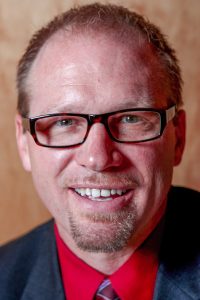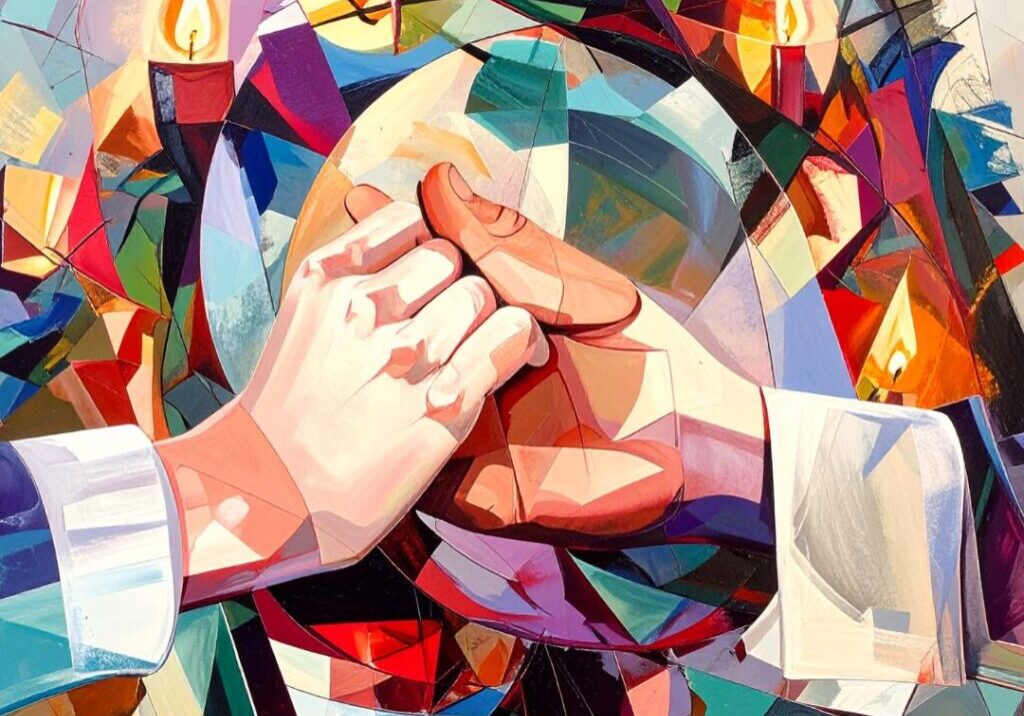Thank Goodness, God is Not in Control!
 It’s common for people who believe in God to respond to suffering, confusion, or evil by saying, “All I know is that God is in control!”
It’s common for people who believe in God to respond to suffering, confusion, or evil by saying, “All I know is that God is in control!”
To the ears of survivors, victims, hurting people, this phrase is rarely reassuring. It leads many to wonder if God is punishing them, has abandoned them, or just doesn’t care about their pain.
In this essay, I explore what it means for God to act, to be powerful, and to love. I’ll introduce a new phrase “essential kenosis” as a way to point to how God always acts, is powerful, always loves, but is unable to prevent evil single-handedly.
Those Who Start with Power
To make sense of how God acts, the majority of people – both trained theologians and novices – begin with God’s power. This is understandable: action requires power of some kind.
The majority of believers have a particular view of divine power in mind, however. They use various words to describe it, including “sovereignty,” “omnipotence,” or “almightiness.” No matter the preferred word, most believe God can control others should God decide to do so. God can be controlling.
By “control,” most think God can single-handedly determine outcomes in the world. Divine control means that God’s actions in relation to someone or something allows no creaturely cooperation or resistance. God alone determines what happens in a situation.
A small group of believers in God think God always controls others all the time. This is what theologians call “theological determinism.” God is the omnicause. [1] Those who affirm this position typically appeal to mystery or the inscrutable divine will when questions about evil and creaturely freedom arise.
The majority of people I meet believe God gives creatures and creation some freedom, agency, and indeterminacy. Some think God controls everything except humans.[2]
Most who say God gives freedom, agency, or existence to creatures say doing so is a free choice on God’s part. They believe God voluntarily chooses not to control others. In their view, the God who could control usually gives freedom.
Beginning with Love
I think there’s a better way to think about how God acts. It begins with love. The alternative view of divine action I propose starts with God’s loving relations to creation rather than God’s power.
Most people believe God loves. Most wholeheartedly affirm the biblical phrase “God is love,” although theologians interpret that statement in various ways. Most say God’s love is steadfast, as biblical writers repeatedly say. I’ve never met a Christian who explicitly denies that God loves.
When I say that my view begins with God’s love, I mean, first, that God’s love is relational. God gives and receives from creatures. Rather than being unaffected by what creatures do, God suffers with and rejoices alongside creatures.
I also believe God’s love is inherently uncontrolling. “Love does not insist on its own way,” to quote the Apostle Paul (1 Cor. 13:5). To put it more clearly, love never single-handedly decides outcomes. God’s love does not control.
When I put this idea in a scholarly way, I say love is logically prior to power in God’s nature. Because God’s nature is first and foremost uncontrolling love, God never controls creatures, situations, or worlds. God can’t control.
Essential Kenosis
I call the view I’m proposing “essential kenosis.” I suspect this phrase is new to most, so let me explain it.
In a letter written to people in Philippi, the Apostle Paul uses the Greek word kenosis. He says, “each of you look not to your own interests, but to the interests of others.” He then says Christ Jesus “emptied himself (kenosis), taking the form of a slave.” This included Jesus humbling himself and dying on a cross. We therefore ought to “work out [our] own salvation with fear and trembling; for it is God who is at work in [us], enabling [us] both to will and to work for his good pleasure” (Phil. 2:3-13).
Scholars translate kenosis in various ways. But many believe this passage says Jesus reveals something important about God’s nature. Jesus’ kenosis tells us something crucial about who God is and how God acts.
The meaning of kenosis is partly given in phrases such as Jesus “taking the form of a slave,” “humbled himself,” and his “death on a cross.” Kenosis refers to action that looks “to the interest of others” and enables “us to will and to work.” Taken in light of Jesus, these phrases suggest that God’s power is essentially self-giving not overpowering. Instead of controlling us, God enables us to act.[3]
Essential Kenosis vs. Voluntary Self-Limitation
Is God’s uncontrolling love a choice? Could God sometimes decide to control?
Some who embrace kenosis theology say God voluntarily self-limits. God could control other creatures or creation but usually choose not to do so.
The voluntary self-limitation view has big problems, however. It says to survivors, victims, and those who have been harmed that God could have prevented their pain. God could momentarily un-self-limit to prevent evil. Notice that Polkinghorne says God “allows” the act of the murderer and the destructive force of an earthquake. The God who freely allows evil, however, is not perfectly loving.
Love does not permit genuine evil that could be stopped.
Essential Kenosis
In opposition to the idea God voluntarily self-limits, essential kenosis says God cannot control anyone or anything. It says God is present throughout all creation, to every creature and entity, no matter how small or large. And God always acts to influence creation. From the big bang, in the emergence of life, through evolutionary history, and ongoing today, God acts with uncontrolling love.
Essential kenosis stands between two related views of God’s love and power. We’ve already looked at one: God voluntarily self-limits. The other view says external forces, factors, agents, or worlds essentially limit God. This view gives the impression that outside actors and powers not of God’s making hinder divine power. Or it says God is subject to laws of nature, imposed from without.
The “external forces limit God” view unfortunately portrays God as a helpless victim to external realities. God seems caught in the clutches of exterior principalities and powers.
Essential kenosis rejects both voluntary divine self-limitation and the idea external powers limit God. It says limits to God’s power derive from within: God’s nature of love. God’s eternal nature is to love others in an uncontrolling way.
Conclusion
In this essay, I sketched out my view and why it matters to start with love when pondering divine action. As I see it, the essential kenosis view of divine action, with its emphasis up God’s self-giving, others-empowering, and therefore uncontrolling love of God offers the best overall model of divine action.
+
Notes:
[1] Paul Kjoss Helseth advocates this view (“God Causes All Things,” in Four Views on Divine Providence, ed. Dennis W. Jowers [Grand Rapids, Mich.: Zondervan, 2011], 52).
[2] Jack Cottrell advocates an interventionist God (“The nature of Divine Sovereignty,” in The Grace of God, The Will of Man, Clark H. Pinnock, ed. [Grand Rapids, Mich.: Zondervan, 1989], 112).
[3] I note biblical scholarship supporting this position in my book, The Uncontrolling Love of God: An Open and Relational Account of Providence (Downers Grove, Ill.: Intervarsity Press Academic, 2015
 View print-friendly version
View print-friendly version
13 Comments
Related Posts

Rewiring Our Lives Together, the Franciscan Way
The Season of Incarnation We are in the season of Incarnation—God becoming flesh. It is a beautiful time of the year that brings out the best of humanity, even in…


I don’t think the model of divine action presented here is existentially compelling. It leaves the weakest among us isolated and hopeless. It makes prayers of supplication meaningless. What would an addict’s prayer or a mentally ill person’s prayer for help sound like? Now, I don’t think that God is a tyrant controlling everything. I think God self-limits what God will and will not do in given instances according to a divine purpose. So, I do think God does more than just empathize or lure us toward the good. Otherwise, then God would just feel our pain and “shrug shoulders” when we don’t follow divine guidance. If God can’t act then we are greater than God because we can act toward that good. Instead, I think there is a partnership between God’s actions and ours at the deepest levels of reality. Obviously, there are many subtleties on how all this could be unpacked and the ontology chosen makes a big difference.
For more on this, here’s my take on the problem of evil:
https://dlcommunion.org/%20the-problem-of-evil/
I think Joel’s Point is two fold
(1) God is Consciousness – Being – Life.
(2) God is not a person like us – a person full of emotions – looking on us and saying ‘Poor things – Sorry you are suffering ‘
Most key Theologians say God is impassible and therefore can’t feel pain.
Sorry, I disagree on several fronts, but you really lost me at ‘God is not a person’. I don’t know where your get your information about ‘God’ but that is not a biblical concept.
Also isn’t this true :
All suffering on earth occurs on the moving platform of time. Individuals in pain struggling to attain, vast catastrophes, epidemics, earthquakes, diseases, famine, drought, war, where are they? All are in the flow of form on the illusory carpet of time. Once you unconsciously accept the time flow, naturally you accept the form flow within the time flow. And it’s this double deception that eventually moves even you right off the platform of time into nothingness. Why do these catastrophes continue in time? Clearly because God does not function in time. It’s quite that simple.
I found this most interesting .
I found parallels in the writings of The Infinite Way by Joel Goldsmith such as the following quote:
“ Conscious Unions with God
Chapter 1: Basis of Spiritual Healing
Awareness of God Is Necessary
Pages 24-25
In The Infinite Way, there is a chapter on “Meditation,” which outlines a course in what may be called spiritual preparation. The first part of this preparation is the practice of awakening in the morning in the conscious realization of your oneness with God. “Except the Lord build the house, they labour in vain that build it.” If you do notvconsciously bring God into your experience with your first waking moment, you may have lost the opportunity of having God with you on every occasion throughout the day. Perhaps, as you read this, you may think, “Oh, God is omnipresent; God is always with me!” Do not believe that; because, it is not true at all! That is one of those clichés – one of those quotations!
It is true that God is omnipresent. It is true that God is right where you are. But, if it is true that God is omnipresent, then God must have been present when all our boys were killed at the front; or, when, of old, the Christians were thrown to the lions; or, when – in the last few decades – thousands of innocent people were slaughtered in concentration camps. What was God doing while all these horrors were going on? Was He there? Then, why was He not helping?
Certainly, God was there. But, God is not a person and God cannot look down on you and tell you He is sorry for the suffering you are enduring. God is omnipresent in the hospitals, in the prisons, at the
battle front. God is omnipresent! But, of what good is that to anybody? Of what good is it to you? Only this: In proportion to your conscious awareness of the presence of God is God available in every instance.
God is present! Certainly. Electricity was present throughout the ages, even when people were using whale oil and kerosene oil. But, of what benefit was electricity to them? None, because there was no
conscious realization of the presence of electricity.
I’ve read about this idea of kenosis before, but this essay about essential kenosis is so much clearer. It really helped me understand the idea much better. The phrase “self-giving, other-empowering” is a fantastic key to remember. Thank you.
I am sorry but I really do not see the difference between “essential kenosis” and “voluntary self-limiting”. God’s love setting limits on God’s power to control events seems to me by definition to be an action of voluntary self-limitation.
Starting from the basis of and foundational Love, your conclusion makes perfect sense to me. I am not a Theologian but a Contemplative and from this perspective the idea and rational of essential kenosis is a fascinating one. “God’s self-giving, others-empowering, and therefore uncontrolling love of God offers the best overall model of divine action.”
I have always said that the Holy Spirit is the female aspect of God the Trinity, and Her promptings in the soul are so subtle that we may miss them if we are not paying attention. Hence, to me, Silence is the preferred Language of God after Christ ascended to Heaven.
Thank you.
I see my comment of the 18th is not approved yet, but I took a similar tac as you Joe. You cannot use dualistic thinking to resolve this question. Where I disagree is when you say that God is ‘another name for everything and everyone’. Not so. God is separate from his creation.
Blessing.
Seems divine control is mixed with human freedom, mysteriously so. Ponder this question, did Jesus (as God) choose or even orchestrate his own role in the crucifixion, or was it carried out by the will of disaffected Jewish clerics conspiring with Imperial Rome? The answer must be a resounding “yes” to each query of the two-part question. How so? The Scriptures declare that Jesus forewarned the disciples on at least 5 occasions that such would happen, knowing in advance that it was his Father’s (predestined) will to do so. Such is easily resolved upon dispensing with separation consciousness (dualistic thinking), that prefers to see in opposites; good and evil, darkness and light, life and death, divine control and human freedom, etc. As incredible as it sounds, God was playing ALL of those roles in the crucifixion drama, appearing in/as Jesus, as well as the Jewish clerics and Romans, even appearing in/as Judas and Pontius Pilate. God “appears as” each and every one for a specific purpose, distinct from each, but not separate. How else can you resolve the following two contrary-sounding Scriptures: “I form the light and create darkness: I make peace, and create evil: I the Lord to all these things” (Isa. 45:7); and “He changes the times and seasons; He removes kings and sets up kings. He gives wisdom to the wise and knowledge to those who have understanding!” (Dan. 2:21). There you have it, divine control and human freedom reconciled. God is another name for everything and everyone, bar none. Let not your hearts be troubled. In the end all will be well. If all is not well, it is not yet the end.